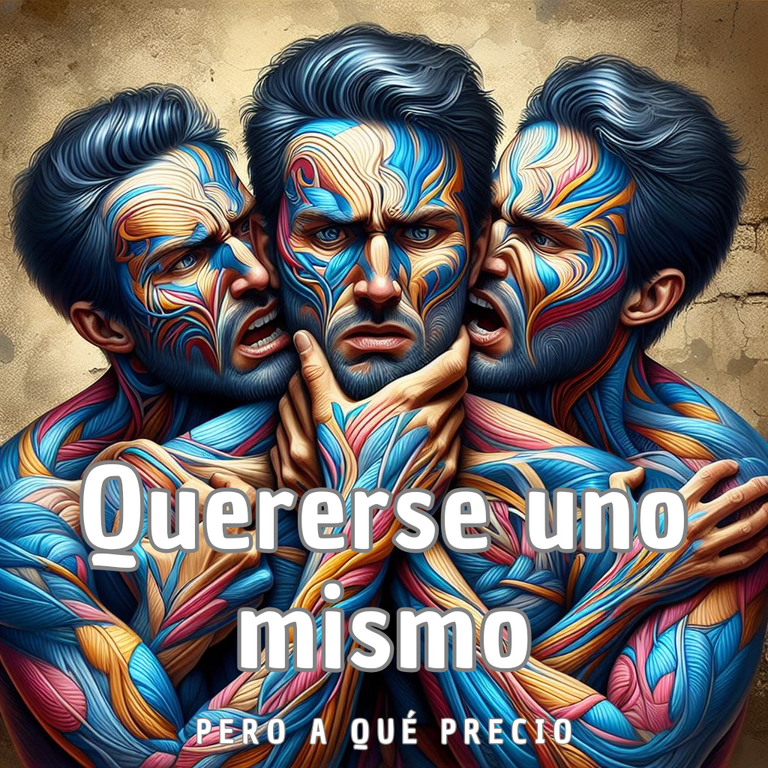Quererse a uno mismo, pero a qué precio | Loving yourself, but at what price [ES/EN]

Ok, hablemos del querer, pero de ese querer a uno mismo que tanto nos imponen en cualquier lugar como premisa indispensable para alcanza el bienestar en relaciones asumiblemente sanas. ¿Será cierto que solamente queriéndonos a nosotros podremos querer a los demás? ¿A qué nos referimos exactamente con querernos a nosotros mismos? ¿A aceptar y validar absolutamente todo lo que nos conforma así sea aberrante y nocivo? ¿Realmente es un acto de amor y cariño aceptarnos sin oposición tal y como somos? ¿Quién ese «yo» al que tengo que querer incondicionalmente?
Es importante que reflexionemos sobre estas preguntas porque son las que estarán guiando esta reflexión de hoy. Así que comenzando por el hecho de asumir que única y exclusivamente queriéndonos a nosotros mismos podremos querer a los demás, ¿realmente podemos asumir que aquellas relaciones consolidadas, felices y duraderas están construidas sobre la absoluta estabilidad emocional de sus miembros? Si pensásemos así estaríamos negando el hecho de que esa otra persona; nuestra pareja, pudiera funcionar de sostén o apoyo emocional para nosotros, y esto no está mal. De hecho, una vez un profesor al que admiro mucho, cuando estaba en la carrera, me dijo que en su experiencia en terapia de parejas, una relación se construye con tres pilares: sexo, intimidad y proyectos futuros, con dos de esos tres pilares incluso se podía construir una relación aunque no tan armoniosa. La intimidad en este caso se refiere al hecho no de lo que ocurra entre cuatro paredes y nadie más lo sepa, sino a la confianza, al poder ser uno mismo en compañía de otro, de soltarnos a hablar libremente de lo que nos gusta y lo que nos duele porque nuestra pareja está ahí para servirnos de contén emocional y apoyarnos, de confianza, complicidad, tener la libertad de explorar(nos) y la seguridad de sabernos en vínculo.
¿Pero quién necesita apoyo o de alguien para que le sirva de contén emocional si somos emocionalmente autosuficientes? Es cierto que cuando buscamos una pareja no lo hacemos únicamente con el propósito de que nos quieran sin más, pero esto también es motivo suficiente para no cerrar las puertas al hecho de que muchas veces sí lo hacemos porque el amar a alguien, el querer, no es un acto consciente y voluntario en el que uno simplemente diga: «esa chica en aquel café, voy a enamorarme de ella», y ¡pum!, se enamora. Si lo vemos desde el psicoanálisis lacaniano, el amor es un semblante, un discurso que le construimos a alguien para hacerlos encajar en nuestra propia realidad. Es así cómo Jacques Lacan enuncia:
Amar es dar lo que no se tiene a quien no lo quiere.
Desde esta perspectiva, amar es un acto de completitud, pero no me malinterpreten porque este tema es clave y lo abordaré en próximas publicaciones; no me refiero a buscar a nuestra media naranja, nuestro complemento, alguien que tiene lo que nos falta como si fuésemos seres imperfectos con piezas faltantes. No, me refiero a un acto de completitud en el sentido de que cuando amamos o queremos a alguien por las razones que sean, hay algo en esa persona en lo que nos vemos reflejados inconscientemente, algo que habla mucho de nosotros por muy diferente que esa persona nos pudiese parecer, y que por eso el amar es un dejarse sorprender.

Por otro lado, si para querer a alguien de la mejor manera tenemos primero que querernos a nosotros mismos, estaríamos poniéndonos una carga enorme e injusta. ¿Han visto por las redes los comentarios acerca de que las personas pobres primero deben alcanzar una mejor posición económica para tener hijos? Pues en mi criterio está al mismo nivel, porque supone una falta de empatía y desconocimiento sobre las diferentes condiciones objetivas y subjetivas que enfrentamos. ¿Acaso las personas con baja autoestima o poca autovaloración no tienen derecho a querer a nadie si no resuelven ante dichas situaciones? ¿Acaso estamos asumiendo a priori que dichas personas han elegido ser así, o que la tienen tan fácil como para resolver aquello por solo querer? Ya en publicaciones anteriores hablaba sobre lo injusto que es hablar desde el privilegio y de asumir el sufrimiento como una decisión.
Las personas que viven una baja autoestima además de pasarla mal por todo lo que ello conlleva, ¿también tienen que privarse de querer a alguien? Si vamos más allá, pienso que este mandato social que asumimos sin cuestionar surge de una mala praxis en la clínica individual de la psicología positiva y de los tantos manuales de autoayuda altamente comerciales que han logrado de alguna forma taponar nuestras individualidades, anularnos, en detrimento de apuntar real y adecuadamente a este fenómeno. Todas las personas deben poder contar con los beneficios de querer, de amar. En muchas ocasiones el solo hecho de querer es terapéutico, no solo por lo que decía anteriormente de que es algo que moviliza conductas, sino también porque contar con alguien más, alguien que acompaña en nuestros procesos, es reconfortante.
Pasando al otro punto, ¿qué es exactamente quererse a uno mismo y por qué deberíamos hacerlo? ¿Acaso ello supondría mayor satisfacción personal o éxito en nuestras vidas? Si pensamos en ello podremos ver que el «uno mismo» queda muy en el aire, lo cual en muchas ocasiones se presta para la manipulación: debemos aceptarnos pero a la primera que manifestemos esa aceptación la sociedad nos va a enjuiciar. Es un mensaje dicotómico presente en muchos ámbitos de la vida. Por ejemplo, las personas introvertidas la pasan muy mal en este sentido porque por un lado se les vende el «sé tú mismo», pero es que se suele asociar la introspección como un rasgo negativo de personas que no tienen amigos, poco exitosas, con problemas, deprimidas, y como consecuencia constantemente se les empuja a situaciones sociales tratando de «arreglarlas». ¿Así cómo es posible quererse uno mismo? Entonces nos damos cuenta de la hipocresía en la que estamos inmersos: «sé tú mismo pero de una forma con la que yo me sienta cómodo porque no estoy dispuesto a lidiar con lo que es diferente a mí.»
Además, querernos nosotros mismos está bien hasta un punto. El límite lo marca la responsabilidad con que se haga. Mucho hemos oído hablar sobre la responsabilidad afectiva, ¿pero qué pasa cuando alguien está aparentemente tan bien consigo mismo que anda por ahí cometiendo sincericidio o soltando pestes y su justificación siempre es «lo siento, así soy yo»? Evidentemente esta persona a alcanzado tal nivel de «autoaceptación» que cae en el egocentrismo y desprecio al otro.

Esto nos lleva a preguntarnos quién es ese «yo» al que tengo que querer. La emocionalidad y la racionalidad van muy de la mano: experimentamos sentimientos y emociones por lo que sabemos o conocemos de nuestra realidad. Así que antes de querernos debemos saber primero quiénes somos. Tarea difícil, ¿eh? Si comprendemos que la personalidad como organización de la subjetividad es estable pero también dinámica, nos daremos cuenta de que somos un proceso constante que siempre está en transformación. Sí, es posible definirnos en cuanto a los rasgos estables que reconocemos en nosotros mismos, pero la vida es mucho más rica que eso y constantemente estamos viviendo eventos que nos impactan en la manera que somos o proyectamos.
Estoy seguro de que hoy no somos las mismas personas que éramos ayer, y de eso también debería tratarse el susodicho amor propio. Eso de primero quererse uno mismo y luego querer a los demás lleva implícita una perspectiva mecanicista donde una cosa antecede a la otra, y ya estamos viendo que no es así. Amarse uno mismo es un proceso al igual que lo es nuestra personalidad. Por lo tanto es imposible cumplir con ello antes de querer a alguien más; se hace al mismo tiempo -si es que se hace-.
Hasta aquí he tratado de deconstruir el mito del quererse uno mismo antes de querer a alguien más, y como siempre, mi intención es invitarlos a cuestionar(nos) todas las creencias y pensamientos que nos han llevado a asumir. Siempre el enfoque es y debe ser subversivo mientras apunte al bienestar propio y colectivo. Así que si leíste hasta aquí, déjame saber en los comentarios qué piensas al respecto porque el conocimiento es mejor si es construido entre todos y todas. ¡Nos vemos en Hive!
English version

Ok, let's talk about loving, but that loving oneself that is so much imposed on us everywhere as an indispensable premise to achieve wellbeing in healthy relationships. Is it true that only by loving ourselves can we love others? What exactly do we mean by loving ourselves? To accept and validate absolutely everything that conforms us, even if it is aberrant and harmful? Is it really an act of love and affection to accept ourselves without opposition just as we are? Who is this "I" that I have to love unconditionally?
It is important that we reflect on these questions because they are the ones that will be guiding this reflection today. So, starting from the fact of assuming that only and exclusively by loving ourselves can we love others, can we really assume that those consolidated, happy and lasting relationships are built on the absolute emotional stability of its members? If we were to think this way we would be denying the fact that this other person; our partner, could function as a support or emotional support for us, and this is not wrong. In fact, once a professor whom I admire very much, when I was in college, told me that in his experience in couples therapy, a relationship is built with three pillars: sex, intimacy and future projects, with two of these three pillars even a relationship could be built, although not so harmonious. Intimacy in this case refers not to the fact of what happens within four walls and no one else knows about it, but to trust, to being able to be oneself in the company of another, to be free to talk freely about what we like and what hurts us because our partner is there to serve as emotional support and to support us.
But who needs support or someone to serve as emotional support if we are emotionally self-sufficient? It is true that when we look for a partner we do not do it only for the purpose of being loved, but this is also reason enough not to close the doors to the fact that many times we do it because loving someone, wanting, is not a conscious and voluntary act in which one simply says: "that girl in that cafe, I am going to fall in love with her", and poof, one falls in love. If we look at it from Lacanian psychoanalysis, love is a semblance, a discourse that we construct for someone to make them fit into our own reality. This is how Jacques Lacan states:
To love is to give what one does not have to someone who does not want it.
From this perspective, to love is an act of completeness, but do not misunderstand me because this topic is key and I will address it in future publications; I do not mean looking for our better half, our complement, someone who has what we lack as if we were imperfect beings with missing pieces. No, I am referring to an act of completeness in the sense that when we love or want someone for whatever reason, there is something in that person in which we see ourselves reflected unconsciously, something that speaks a lot about us no matter how different that person may seem to us, and that is why loving is an act of letting ourselves be surprised.

On the other hand, if in order to love someone in the best way we have to love ourselves first, we would be putting an enormous and unfair burden on ourselves. Have you seen on the networks the comments that poor people must first reach a better economic position in order to have children? Well, in my opinion it is at the same level, because it implies a lack of empathy and ignorance about the different objective and subjective conditions we face. Do people with low self-esteem or low self-worth have no right to love anyone if they do not resolve such situations? Are we assuming a priori that these people have chosen to be like that, or that they have it so easy as to solve that just by loving? In previous publications I talked about how unfair it is to speak from the privilege and to assume suffering as a decision.
On the other hand, if in order to love someone in the best way we have to love ourselves first, we would be putting an enormous and unfair burden on ourselves. Have you seen on the networks the comments that poor people must first reach a better economic position in order to have children? Well, in my opinion it is at the same level, because it implies a lack of empathy and ignorance about the different objective and subjective conditions we face. Do people with low self-esteem or low self-worth have no right to love anyone if they do not resolve such situations? Are we assuming a priori that these people have chosen to be like that, or that they have it so easy as to resolve it just by loving? In previous publications I talked about how unfair it is to speak from the privilege and to assume suffering as a decision.
Do people who experience low self-esteem, besides having a hard time because of all that it entails, also have to deprive themselves of loving someone? If we go further, I think that this social mandate that we assume without questioning arises from a malpractice in the individual clinic of positive psychology and the many highly commercial self-help manuals that have somehow managed to plug our individualities, to annul us, to the detriment of really and adequately targeting this phenomenon. All people should be able to count on the benefits of wanting, of loving. On many occasions the mere fact of loving is therapeutic, not only because of what I said before, that it is something that mobilizes behaviors, but also because having someone else, someone who accompanies us in our processes, is comforting.
Moving on to the other point, what exactly is it to love oneself and why should we do it? Would it mean greater personal satisfaction or success in our lives? If we think about it, we can see that the "self" is very much in the air, which often lends itself to manipulation: we must accept ourselves, but the first time we show that acceptance, society will judge us. It is a dichotomous message present in many areas of life. For example, introverted people have a hard time in this sense because on the one hand they are sold "be yourself", but introspection is usually associated as a negative trait of people who have no friends, are unsuccessful, with problems, depressed, and as a consequence they are constantly pushed into social situations trying to "fix" them. So how is it possible to love oneself? Then we realize the hypocrisy in which we are immersed: "be yourself but in a way that I am comfortable with because I am not willing to deal with what is different from me."
Besides, loving ourselves is fine up to a point. The limit is set by the responsibility with which it is done. We have heard a lot about affective responsibility, but what happens when someone is apparently so good with themselves that they go around committing sincericide or spouting off and their justification is always "I'm sorry, that's just me"? Evidently this person has reached such a level of "self-acceptance" that he/she falls into egocentrism and contempt for the other.

This leads us to ask ourselves who is this "I" that I have to love. Emotionality and rationality go hand in hand: we experience feelings and emotions because of what we know or know about our reality. So before loving ourselves we must first know who we are. Difficult task, eh? If we understand that personality as an organization of subjectivity is stable but also dynamic, we will realize that we are a constant process that is always in transformation. Yes, it is possible to define ourselves in terms of the stable traits we recognize in ourselves, but life is much richer than that and we are constantly living events that impact us in the way we are or project.
I am sure that we are not the same people today as we were yesterday, and that is also what the aforementioned self-love should be about. The idea of first loving oneself and then loving others implies a mechanistic perspective where one thing precedes the other, and we are already seeing that this is not the case. Loving oneself is a process as is our personality. Therefore it is impossible to fulfill it before loving someone else; it is done at the same time -if at all-.
So far I have tried to deconstruct the myth of loving oneself before loving someone else, and as always, my intention is to invite you to question all the beliefs and thoughts that have led us to assume. The approach is always and should always be subversive as long as it aims at our own and collective wellbeing. So if you have read this far, let me know in the comments what you think about it because knowledge is better if it is built among all of us. See you in Hive!

Créditos | Credits
Imágenes utilizadas | Images used:
- Todas las imágenes son de mi propiedad y fueron generadas utilizando la IA de Bing Image Creator | All images are my own and were generated using Bing Image Creator's AI.
- La imagen de portada fue editada en Canva | Cover image was edited in Canva.
Traducción | Translation:
DeepL
Te puede interesar | You may be interested in:
- Hablemos del divorcio. ¿Cómo impacta en la familia y en los hijos e hijas? | Let's talk about divorce. How does it impact the family and children? [ES/EN]
- La injusticia de hablar desde el privilegio | The injustice of speaking from privilege [ES/EN]
- ¿El sentido del sufrimiento o el sufrimiento sentido? | The meaning of suffering or felt suffering? [ES/EN]
Congratulations @genrigp! You have completed the following achievement on the Hive blockchain And have been rewarded with New badge(s)
Your next target is to reach 600 upvotes.
You can view your badges on your board and compare yourself to others in the Ranking
If you no longer want to receive notifications, reply to this comment with the word
STOPTo support your work, I also upvoted your post!
Excelente como siempre!
Gracias, me alegra que te haya gustado ☺️🫂
Hola he leído su escrito me parece muy interesante. Quisiera hacerle unas preguntas. ¿ Cómo puede una persona adulta trabajar en su amor propio?